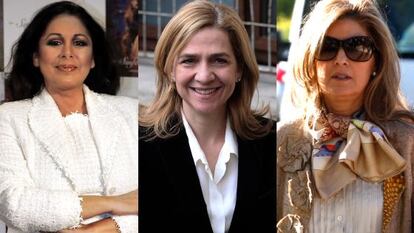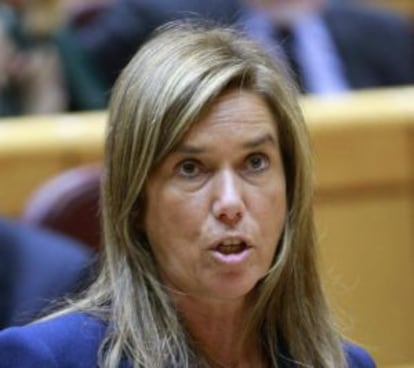The good wives
The treatment of the spouses of corruption suspects in Spain has varied from case to case

Spain’s courts have arrived at vastly different rulings when investigating and assessing the role played by the wives and partners of men targeted for investigation in the country’s recent spate of corruption cases.
The Supreme Court’s view is that if someone has benefited from their husband’s ill-gotten gains, it is necessary for them to have known that a crime was to be committed beforehand if they are to be targeted by the justice system. That said, the Supreme Court adds: “Somebody who deliberately ignores something that they can and should know, and who then benefits from the situation, is assuming and accepting all the possibilities of the origin of the business they are participating in, and should therefore answer for their consequences.”
Based on the evidence accumulated during an investigation, each court decides if the partner of somebody involved in corruption should be investigated on the basis of direct knowledge of wrongdoing or for deliberately having ignored it; or conversely, that they should not be investigated because they genuinely knew nothing about what was going on, even if they benefitted indirectly or directly. Although these might seem similar circumstances, it is the evidence gathered in an investigation that determines how the wife of somebody accused of corruption will be treated by the courts.
Isabel Pantoja, whose singing career in Spain has spanned the last four decades, has been convicted of money laundering and faces a two-year jail term for her role in the offenses committed by her former partner Julián Muñoz, who has been jailed for crimes during his time as mayor of the resort city of Marbella. His former wife, Mayte Zaldívar, has also been sentenced to jail, for two-and-a-half years. Neither woman was a registered business partner of Muñoz, but both have been found guilty of helping him launder money that he acquired illicitly.
The king’s daughter Cristina de Borbón used company credit cards to buy things that had nothing to do with the business
Cristina de Borbón, the youngest daughter of former king Juan Carlos, is being investigated for tax evasion. She held a 50-percent stake in Aizoon, a company she set up with her husband Iñaki Urdangarin, who has been accused of money laundering and eight other financial crimes. The provincial court of Palma de Mallorca has ruled that there is insufficient evidence to investigate Princess Cristina for money laundering. But it says that she can face possible investigation for tax evasion. Aizoon was used as a vehicle for her husband to pay less tax than he was required. Cristina de Borbón “was contributing to tax evasion by participating in Aizoon, and she too benefitted from it,” says the court. She also used company credit cards to buy things that had nothing to do with the business. The public prosecutor’s office says that it will not bring charges against her, and it now looks unlikely that the tax office will either.
Mercé Gironés, the wife of Jordi Pujol, the former long-standing head of the regional government of Catalonia, was the registered joint-owner of several companies into which some €8 million were paid over a period of eight years by companies that had won service contracts with the regional government of Catalonia. The judge overseeing the investigation says that there is evidence that this money was illegally accrued and that the couple had offshore bank accounts. She is being investigated for money laundering and tax evasion.

Health Minister Ana Mato faces accusations that while she was married to Jesús Sepúlveda, the former mayor of wealthy Madrid dormitory town Pozuelo, she was the beneficiary of vacations, cash payments and gifts from businessmen who are being investigated for bribing officials in the Gürtel case, a kickbacks-for-contracts network. The judge overseeing the allegations, which supposedly took place in 2002 and 2003, said he could not investigate Mato because they had fallen outside the statute of limitations. As the public prosecutor’s office noted in 2009: “The only crime that at this point [Mato] could be accused of is bribery, punishable with a prison sentence of between three and six months, but only within three years of the offense taking place.”
Rosalía Iglesias, the wife of former Popular Party treasurer Luis Bárcenas, is being investigated for money laundering and tax evasion.
Rosalía Iglesias, the wife of former Popular Party treasurer Luis Bárcenas, is being investigated for money laundering and tax evasion. In 2010, the judge overseeing the case assumed that Iglesias was financially dependent on her husband. “She had no understanding of tax or investment,” said the judge closing the investigation into her. Iglesias stated that she had never seen as much as €150,000 in cash, but a year later, it was discovered that she had paid €500,000 in €500 notes into a bank account in her name. She was subsequently questioned again over this and other matters but has failed to provide a satisfactory account as to the origin of the funds.
Teresa Gabarra and Elena Samaniego are the wives of Alberto López Viejo and Arturo González Panero, respectively. Both men are accused of a range of charges relating to the Gürtel case. The investigating magistrate says that Gabarra helped her husband launder money in Switzerland. Samaniego is also being investigated for money laundering, and supposedly benefitted from money hidden away in Swiss bank accounts.
Spanish law defines money laundering as “the acquisition, use, conversion or transmission of assets originating in criminal activities or the participation therein, to hide or cover their origin or to help the person that has participated in the activity from eluding the legal consequences of their actions, as well as hiding or covering the true nature, origin, location, disposition, movements or the ownership or rights over the same, even when the activities that generate them take place on the territory of another state.”
Tu suscripción se está usando en otro dispositivo
¿Quieres añadir otro usuario a tu suscripción?
Si continúas leyendo en este dispositivo, no se podrá leer en el otro.
FlechaTu suscripción se está usando en otro dispositivo y solo puedes acceder a EL PAÍS desde un dispositivo a la vez.
Si quieres compartir tu cuenta, cambia tu suscripción a la modalidad Premium, así podrás añadir otro usuario. Cada uno accederá con su propia cuenta de email, lo que os permitirá personalizar vuestra experiencia en EL PAÍS.
¿Tienes una suscripción de empresa? Accede aquí para contratar más cuentas.
En el caso de no saber quién está usando tu cuenta, te recomendamos cambiar tu contraseña aquí.
Si decides continuar compartiendo tu cuenta, este mensaje se mostrará en tu dispositivo y en el de la otra persona que está usando tu cuenta de forma indefinida, afectando a tu experiencia de lectura. Puedes consultar aquí los términos y condiciones de la suscripción digital.









































